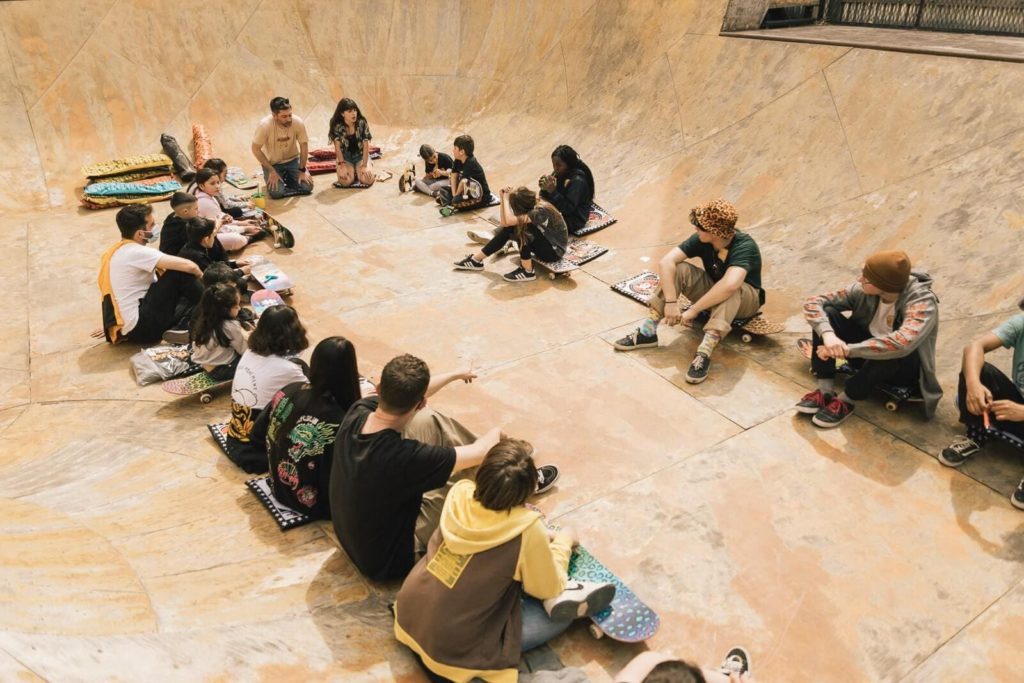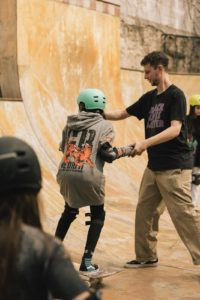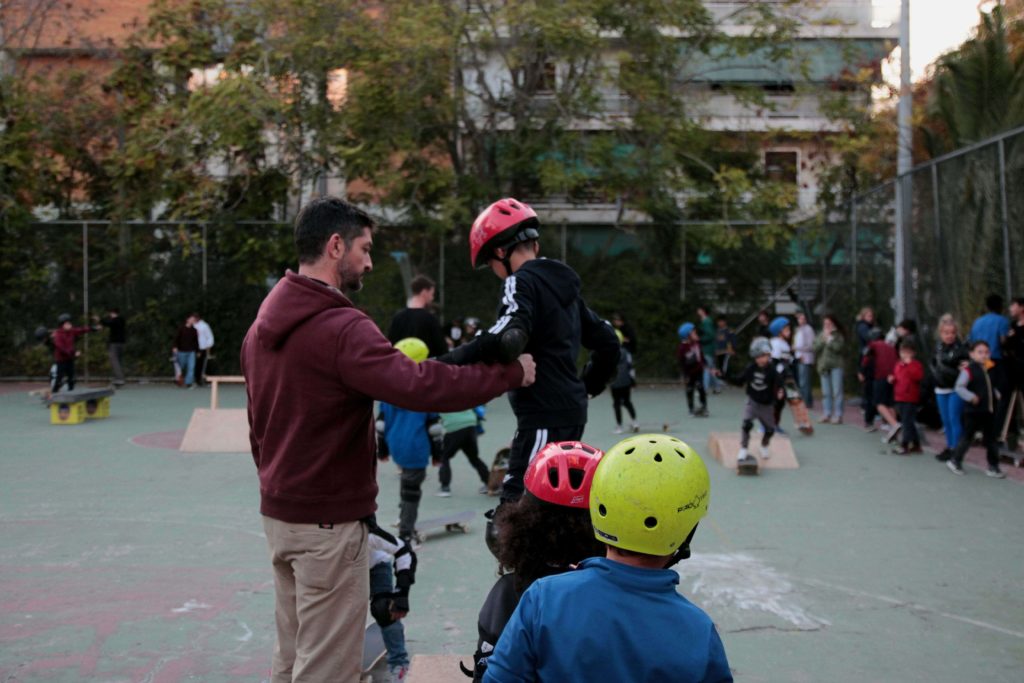How skateboarding is helping refugees in Athens find happiness

What Will Ascott has done with his life is far from normal.
He grew up in St Albans, an area he describes himself as ‘very middle class’ and lived a life of relative comfort.
“It’s a lovely, pretty place. I was very lucky to grow up there” he says.
After a comfortable upbringing though, Ascott decided to make a change.
He first moved to Palestine to help young people there, and then ended up in Athens where he set up the charity Free Movement Skateboarding.
The charity aims to help refugees by getting them socialising and active, crucially, whilst skateboarding.
Speaking from a flat lit up by the Mediterranean sun, Ascott explains how a boy who grew up in St Albans ended up across Europe helping those that so many choose to ignore.
“I started skating when I was 10 but growing up where I did can create a slight middle-class bubble.
“The people I went to school with didn’t really interact with a diverse group, whereas through skating you meet people from different backgrounds and hang out on a level playing field.
“On the street you get a bit more direct exposure to things like homelessness. I think this kind of informed a bit of a disenfranchised feeling with how things are in the world.”
Skateboarding Abroad
It was this disenfranchised feeling that led Ascott to move to Palestine with a group called Skate Pal, aiming to grow the sport there.
Following this he moved to Athens. He initially worked for the food distribution company CORA but he had an urge to create something for himself.
“I had this idea and was just like, if I don’t do it now, I’ll regret it for the rest of my life” he says.

The idea was to create a mobile skatepark which would allow them to reach different groups of people throughout the city.
They would have a van full of ramps and go to different disadvantaged areas, such as refugee camps, and get people out and about on a skateboard.
A question Ascott gets a lot is: why skateboarding? In England, whilst popular, it’s a niche sport and perhaps people wouldn’t immediately think it’s something that could help refugees.
When asked this question Ascott, who is generally charming and funny throughout the conversation, immediately becomes serious as his passion for the sport shows.
“There’s a lot of values that are really inherent to skateboarding that are just good for young people in disadvantaged situations.
“It forces you to be really individually focused whilst also being really happy at the same time. You can only achieve something with good mindful focus and a lot of self-belief.”
He also believes that skating can help to build communities.
“Parallel to you is someone from a different background or ethnicity with a different level of ability
“They’re doing their thing, and you do yours, and even though yours might be much harder you’re just happy to see them progressing and trying something new.
“I think that’s something that just brings people together and it can be replicated across the world no matter what the context.”
Planning for Athens
Ascott had to move back to England to build up funds and then, with the help of his friend Ruby, they set off to Athens with just a van full of skate ramps. Free Movement Skateboarding had begun.
Five years later and the sessions have evolved from simply getting groups of young people skating on ramps.
Typical sessions involve plenty of one-to-one tuition but now start with a sit-down session where a life value is discussed and then applied to the world of skateboarding.
An example Ascott gives is the idea of goofy and regular. In skateboarding you are riding ‘regular’ if you lead with your left foot and goofy the opposite.
“We’ll explain this and then one instructor will show that they’re goofy, and then I’ll say I’m regular.
“We’ll then stress that the important thing is we’re different but we’re all here and doing the same thing.”
Building this community aspect is one of the core goals of Free Movement Skateboarding and it is important to Ascott that this includes women.
“For a very long-time skating has been a bit of a boy’s club.
“The attitude to women has tended to be ‘you should just feel fine, so come along it’s fine’, but that’s just not how all women feel about coming to a male dominated space.”
They have combatted this issue by having a lot of female teachers and sometimes holding women’s only sessions in secluded spaces.
Their efforts are clearly having an effect as roughly 40% of participants at their sessions are now female, a number you would not see replicated at many skateparks throughout the world.

Issues with law changes in Athens
However, a change to Greek law during the first Coronavirus wave has caused major issues. The change stopped any companies that weren’t Greek registered NGOs going into refugee camps.
Ascott’s frustration at this is obvious: “It was sneaky you know; a big international mega event has happened, and it felt like they used that to sneak this change through.”
To register as a Greek NGO there are tough requirements such as having two years of accounts and meeting ISO regulations which would cost the company around €10,000 to attain.
But even this sometimes is not enough.
“There are some NGOs that meet all the requirements,” explains Ascott. “But there’s then an anonymous gatekeeping committee that are still rejecting them.
“The only ones getting passed have been big international ones linked to the UN.”
Ascott believes the reasoning for this is simple.
“Greece needs to be seen disincentivising migrants to come here by making it unpleasant.”
There is no doubt that the work Free Movement Skateboarding did bought happiness to refugees who were in desperate need of it, and to take this away is cruel.
“They were really special days”, Ascott explains, “I can’t tell you how much it means to those kids.
“They’re very isolated in very concrete, unpleasant and under stimulating environments for 99.9% of their lives.
“So being able to bring them to a place where there’s trees and they can skate is amazing.
“It’s pretty hard to get the kids back to the camp afterwards, because they’re just saying this is the best day ever.”
Skateboarding affecting change
Despite not being able to get into refugee camps at this moment they are still able to help plenty of disadvantaged people in Athens.
One example of the work they did stands out to Ascott.
A young Persian girl had been displaced all her life and moved from Afghanistan to Iran, then to Turkey and then Lesbos before ending up in Athens.
It was there that she first joined Free Movement Skateboarding where she became a skate teacher.
“She was a real role model. She helped teach, translate and massively support those involved.”
The girl has since moved to Germany where she is looking to become a vet, but she still skates and even ran her own skate school for a while.
“She really inspires me. I think she’s evidence that this is a model that works, and it’s like a self-replicating thing.
“These things create young people that want to engage in this kind of stuff and run it themselves. That’s really important”, he says.
Looking to the future Ascott hopes to create a permanent skatepark in Athens, and they are working on becoming a Greek registered NGO.
This will allow them not just to continue their work, but scale it up, and help more people that need it in their own unique way.